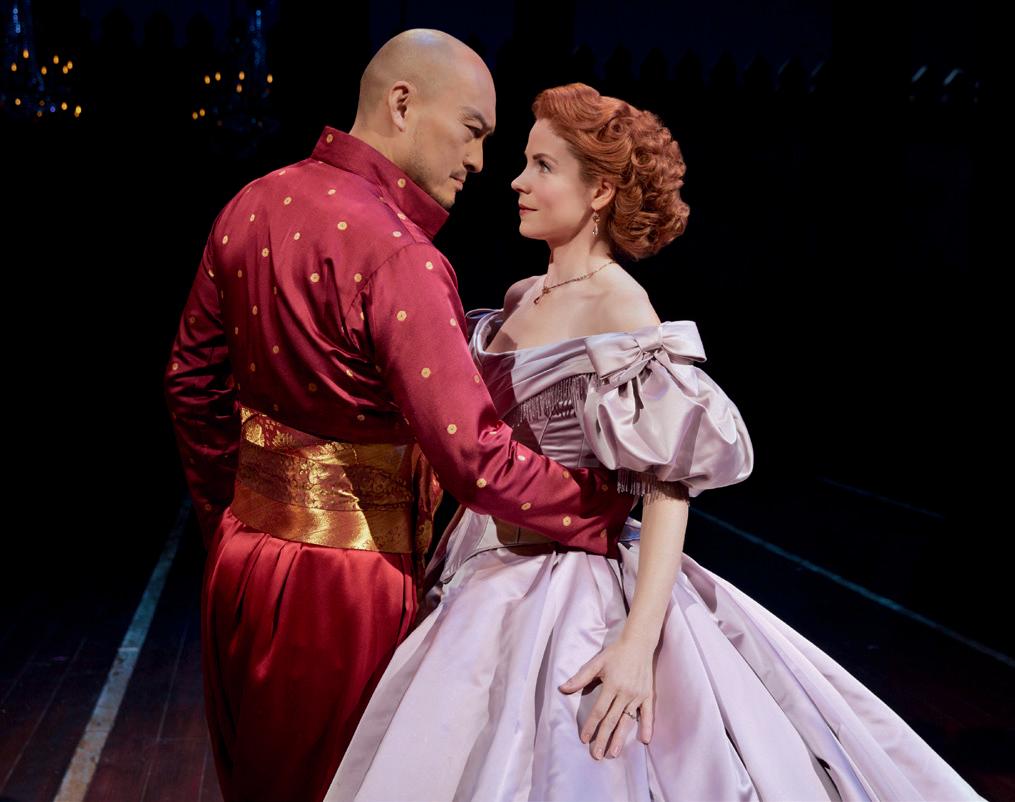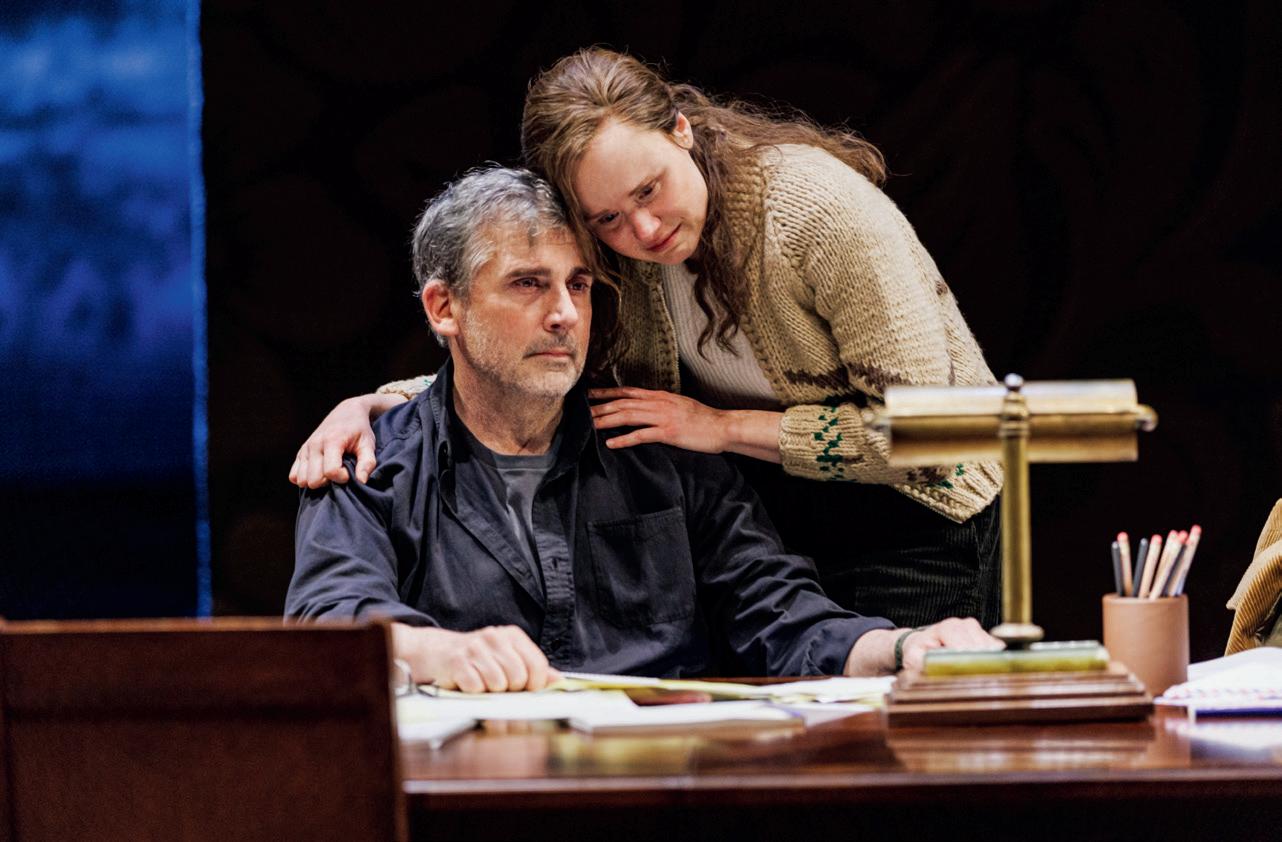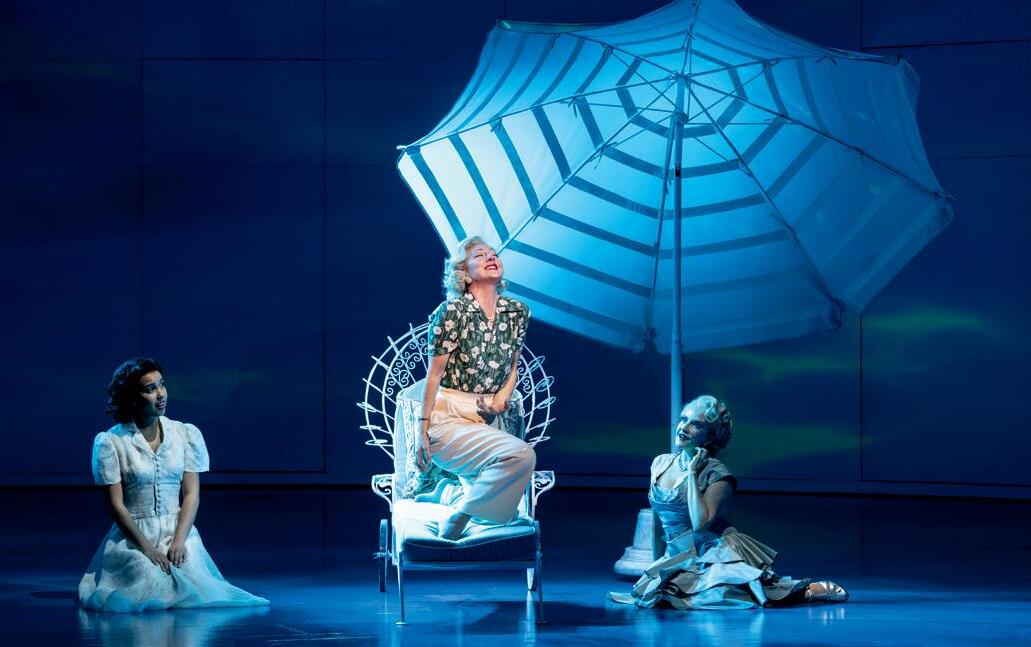
17 minute read
SOME ENCHANTED EVENINGS
STAFF SHARE MEMORIES OF SHOWS THEY’LL NEVER FORGET
THE DISTANCE BETWEEN US: THEATER, FAMILY, AND FINDING HOME
by Peter Studlo
ON THE CUSP OF MY 22ND BIRTHDAY, a pivotal moment unfolded as I sat in the audience of the Mitzi E. Newhouse at Lincoln Center Theater. Fresh out of undergrad, I was a Chicago native at a significant crossroads: to move to New York City or Los Angeles? This decision would dictate the trajectory of my career in the arts. My visit to New York that summer was a mission to discover if this city could indeed be my new home.
This quest led me to Lincoln Center Theater where I secured a last-minute ticket to 4000 Miles by Amy Herzog, a centerpiece of their LCT3 new works program. It was my inaugural experience at Lincoln Center Theater, and it profoundly shaped my perspective, relationships, and future.
4000 Miles narrates the journey of Leo, a 21-year-old man wrestling with life’s uncertainties and his own grief, alongside his grandmother Vera, after a cross-country bike venture. Set against the backdrop of contemporary New York City, the play delves into the complexities of relationships, grief, and intergenerational dynamics, offering a poignant exploration of the human condition. Given that I was at a similar stage as Leo, navigating the complexities of young adulthood, his story resonated deeply with me.
This connection was intensified by my own summer living arrangement. I was spending the season with my 90-year-old grandmother, Nonny, who was recuperating from hip surgery at my parents’ home. As Leo and Vera’s relationship unfolded on stage, I saw reflected in their interactions the deepening bond between Nonny and myself.
Like Leo’s grandmother Vera, Nonny was a fiercely independent woman and no stranger to adversity. As a WWII nurse who migrated alone to Chicago from the East Coast, Nonny had faced life with a kind of brave steadfastness that I had always admired. But that summer, our conversations, once casual, had grown into rich dialogues bridging generations, filled with her wisdom, and punctuated by her encouragement to seek adventures, to live boldly as she once had. She shared stories I’d never heard, revealing layers of her life that painted a picture of profound bravery and resilience.
The cozy amphitheater-inspired design of the Mitzi became my favorite venue. Its unique configuration fosters a shared yet intimate experience that thrusts the audience right into the heart of the narrative. The play, in its intimate portrayal of cross-generational connection, did more than entertain; it acted as a catalyst for introspection. It underscored the parallels in our lives—Leo’s and mine—each tethered to the grounding influence of our grandmothers.
That night at Lincoln Center Theater, as Leo found his path within the comforting confines of his grandmother’s wisdom, I too found clarity. The decision to make New York my home, to immerse myself in its vibrant theater scene, seemed not just a choice but a calling—a continuation of the adventurous spirit Nonny had nurtured in me. This single evening didn’t just mark a decision to move to New York; it was the beginning of a decade-long journey that shaped my professional life and deepened my appreciation for the transformative power of theater.
Lincoln Center Theater would become much more than a place where I enjoyed performances; less than two years after seeing 4000 Miles, I began working behind the reception desk at the theater. It’s now been ten years, and LCT has become the site of my professional growth as the office manager. Here, I not only learned the intricacies of theater management but also the importance of community in the arts—a value that Lincoln Center upholds magnificently.
Lincoln Center Theater, with its commitment to nurturing new works and talents, proved to be an ideal place for both young aspirations and the wisdom of age. It has been a foundational part of my career and personal development, continually inspiring growth and understanding in the arts and beyond.
Reflecting on that night watching 4000 Miles, I see it as more than just a theatrical experience; it held up a mirror to my life at a critical moment. It underscored the importance of family, the value of personal journeys, and the profound impact of theater on life.
In the theater’s shared space, under the soft glow of stage lights, the play helped me understand the value of both the roots of home and the wings I was ready to test. It reminded me that no matter where our journeys take us, our connections—from those threads that bind us to our past to the ones who shape us—are as enduring as the stories we hold dear.
Several years after that summer, Nonny passed away. Her absence as the matriarch left a deep void for my family, yet whenever I walk past the poster for 4000 Miles at work, it’s as if the memory of the play bridges the gap between here and the hereafter. Nonny had always been proud of me, loving me unconditionally and cheering on my adventures, and standing in front of that poster, I feel her encouragement as palpably as ever.
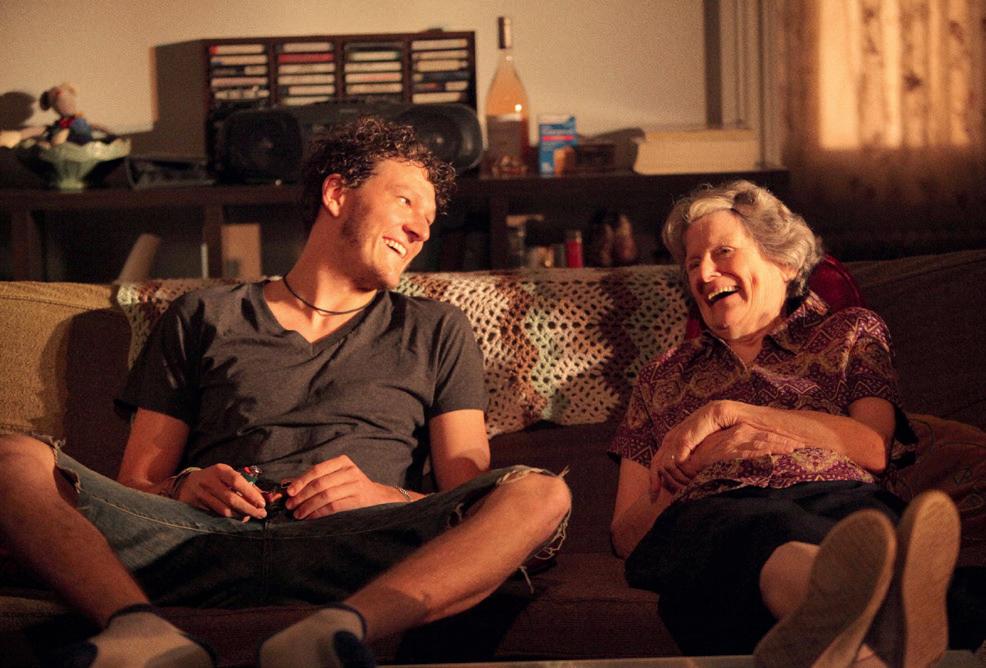

ON RETURNING
by Nick Buchholz
IN THE SUMMER OF 2019 , we were alerted that Lincoln Center Theater was to produce Flying Over Sunset, a new musical by the theatrical luminaries James Lapine, Tom Kitt, and Michael Korie, opening in the Spring of 2020. Of course, James Lapine is a legend—his work changed my life as a young theater person falling down YouTube holes and discovering masterpieces like Sunday in the Park with George, Into the Woods, and Passion (I own the DVDs of all the filmed performances). To be even a small part of the legacy of a new James Lapine musical shocked and thrilled (and kind of intimidated) me. I immediately connected to Flying Over Sunset and believed in it from the get-go. I felt (and still do feel) like it was the exact right production that a nonprofit institution like ours should be producing and supporting, especially in a time where musicals like this didn’t (and still don’t) get the chances they deserve. Plus, it would be my first original musical credit on Broadway!
Then, of course, in 2020 the world shut down due to the Covid-19 pandemic. Lincoln Center Theater leadership and the board ensured our productions would be back. I can still recall popping into the building several times over the shutdown and stopping by the Mitzi and the Beaumont to take in the empty theaters, the intact sets still on the stages, and feeling the ghosts of the past and the thrill of what was to come.
Upon LCT’s return to live theater in 2021, I couldn’t keep myself from staying out of the rehearsal room and tech for Flying Over Sunset. I immersed myself as much as I could in the process of watching the cast and creatives breathe life back into this daring new musical. Returning to work after the pandemic felt like the great community builder. It was a true whole company— cast, crew, creatives, management, and staff— all uniting for one goal: put on a magical and bold piece of theater in the wake of global trauma.
I recall sitting in tech and witnessing Carmen Cusack as Clare Booth Luce sing a riff in the title song she had never sung before—the stage manager called “hold!” and Tom Kitt had her try it again. It stayed in the show and was immortalized on the cast recording. I remember the night the company put in a whole new Act One finale, and I watched choreographer Michelle Dorrance tirelessly work out the opening rhythmic sequence with the company. Ultimately, I think I saw the show 12 times in full (probably more).
A combination of working on a completely new and original musical, written by theater legends, and produced impeccably by a premiere institution left an indelible mark on me. It’s an experience and a production I will not soon forget and will always be proud to have been even a small part of.
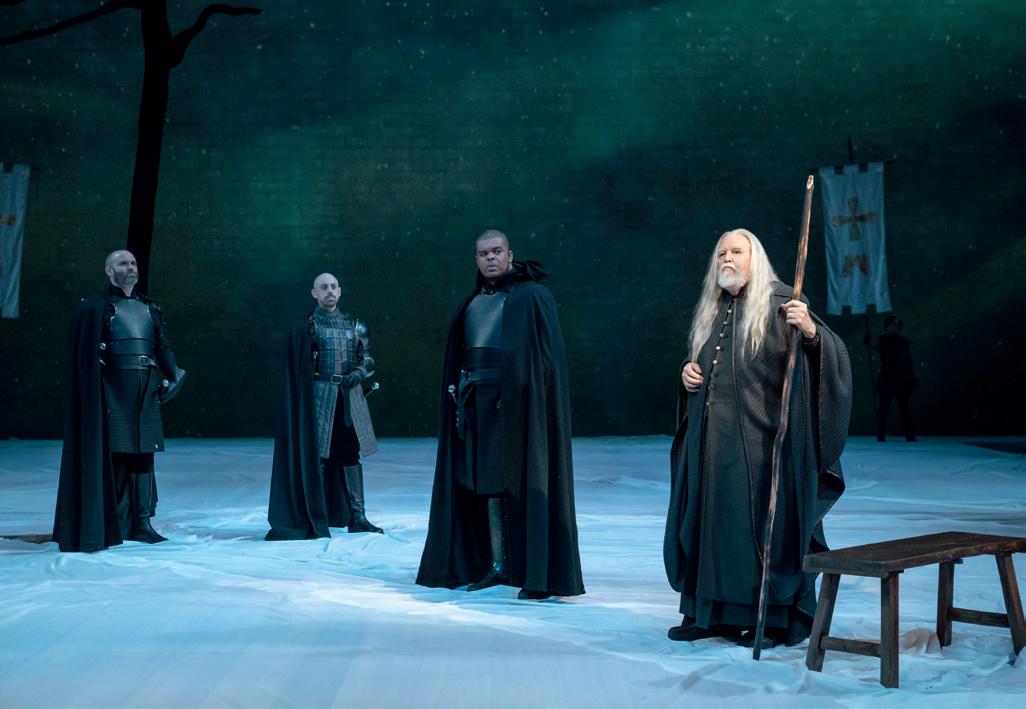
LET HOPE NOT BE FORGOT
by Christian Clinton
DURING CAMELOT ’S STINT at the Vivian Beaumont, I had the pleasure of watching this production four times, each one better than the last. However one performance struck me profoundly: the understudy performance of Fergie Phillipe in the role of King Arthur. This particular performance made me feel so much joy and inspiration—it was unlike any performance I have seen before. As a person of color and a member of Generation Z, I watched the role of King Arthur take on new dimensions when played by a Black actor. During this performance with Fergie at the helm, the audience is shown the story of Arthur, a poor Black child, who found the sword in the stone and became the prophetical King of England. I was reminded of the first election of Barack Obama, and that feeling of hope and possibility. The power of Fergie’s performance made me feel so much empathy towards King Arthur, and a sense of magic drew me in and felt like we’ve come a long way to see this in front of our eyes.
When you watched Fergie’s performance as King Arthur you can see the weight of Camelot on his shoulders, you can sense the sharpness of his Knights in the form of slight microaggressions— questioning his power as the show progresses, you feel the love he has for Guinevere and the pain that comes with his discovery of her affair with Lancelot. I can’t help but thank Bartlett Sher for having him be the choice of understudy— otherwise, I don’t think I would have been moved enough to write this. Another genius mark for a historic run for one of Broadway’s Golden Age musicals.
What I took away from Bartlett Sher’s diligently detailed direction was the idea of building a legacy and “fixing” the world for future generations is not something only those in positions of power are capable of; we, the people, are able to as well. King Arthur states in his first scene with Guinevere that, “together we may discover if power can be harnessed as a force of good.” These eloquent words, newly written by Aaron Sorkin, tells us that Arthur believes if we work together we could change the future of our world and its policies.
Barack Obama said, “Hope is not blind optimism . . . hope is the belief that destiny will not be written for us, but by us, by the men and women who are not content to settle for the world as it is, who have the courage to remake the world as it should be.” We hold onto the spirit of hope with the belief that things could change if we worked together instead of against each other. We constantly grapple with the idea of what our world could look like and what we leave behind.
Our journey in this life begins with our first step, what we do next is based on our willpower and confidence to move forward. I hope that many more found a sprinkle of what I did during Camelot’s run, and that it spoke to them. I have a lot of faith in the world and the people in it. I hope that one day we will all work together and tread forward to that beautiful idea where we can build our own Camelot.
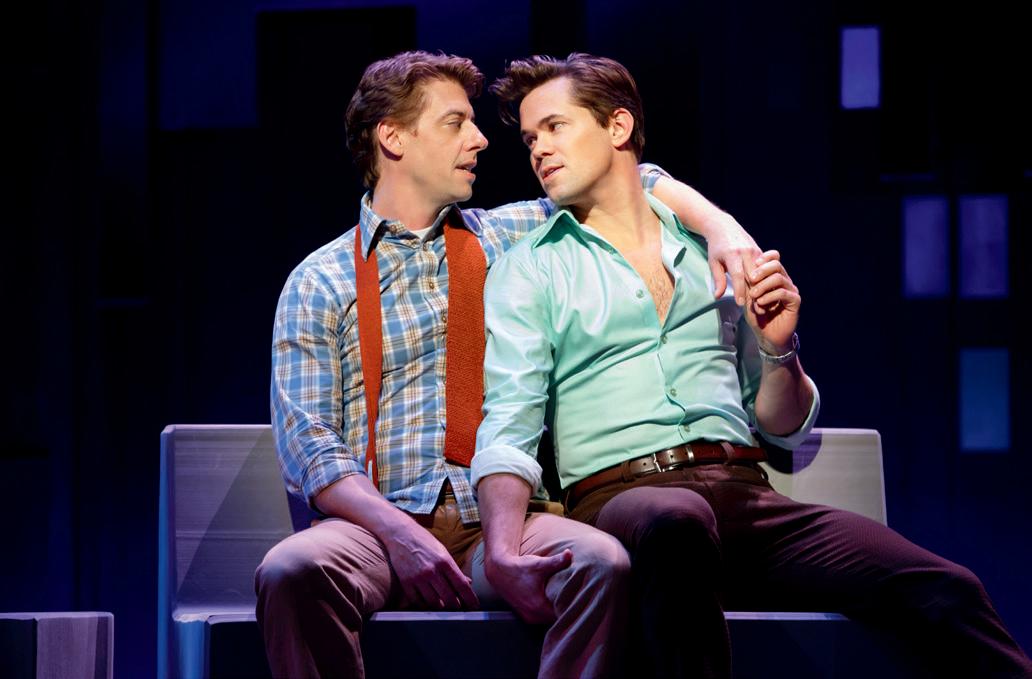
50 STEPS AWAY
by Juliana Hannett
IN THE SUMMER OF 1993, on a particularly hot Saturday afternoon, my Mom and I took the trip from Long Island into the city to see a show. We headed directly to the TKTS booth and got in line. I was in charge of picking out what we would see and I couldn’t wait to get to the front of the line to see my choices, but fate intervened. Someone came by flyering the line, and approached us with an offer for twofers (remember twofers?!) for a show called Falsettos. Neither of us was familiar with the show, but being a devotee of Chip Zien and James Lapine from wearing down my VHS copy of the original production of Into the Woods, I approved the selection quickly, we snapped up those twofers, and headed for the Golden Theater box office to redeem them. Luxuriating in the air conditioing, I was feeling that amazing combination of nervous excitement for something new. Once the house lights went down and the show began, my infatuation with the work of one William Finn was ignited. I had never seen anything like Falsettos before, and I was immediately hooked on Finn’s infectious melodies and profound storytelling. Cut to the summer of 1998: I had graduated college and was living in the city, trying to make my way as a stage manager (I later began my career as a publicist in 2001). My longtime friend Josh Rich had recently started working at Lincoln Center Theater and it was a thrill to be able to get in to see shows there; any invitation I received was met with an enthusiastic “yes please!” Imagine my joy when I saw that Lincoln Center Theater was producing a new William Finn musical, A New Brain, and oh my gosh, I was going to get to see it! I was so grateful to be sitting in the Mitzi E. Newhouse Theater that night, the familiar feeling of nervous excitement flowing through my veins. Little did I know at that moment that A New Brain would become one of my favorite musicals of all time. It was pure magic for me that night: every song, every performance, every granular moment of that show immediately encoded itself into my DNA. It was one of those shows that sent me out into the street yelling “THEATER!” at the top of my lungs because my emotions were overflowing and my heart bursting. When I decided to pursue theater as a career, this is what I signed up for. Those voices! The sounds of Kristin Chenoweth, Malcolm Gets, Christopher Innvar, Liz Larsen, Michael Mandell, Mary Testa, and Chip Zien felt like lightning traveling through me. William Finn’s story captivated me—I had become emotionally invested in these characters. I felt like I knew them, and I cared about them ferociously. The cast album became, and remains, a daily part of my life. “Change” is one of my go-to shower songs. I leapt at the chance to see the City Center production in 2015. Last summer, I traveled to see the delightful production at Barrington Stage Company. My devotion to A New Brain knows no bounds. I have continued to enjoy William Finn’s work, but he truly changed my life that night in the Mitzi E. Newhouse Theater and I will be eternally grateful to him and to Lincoln Center Theater for that. Here in the summer of 2024, the universe has aligned itself so that I am somehow privileged enough to now be a part of the fabric of this august institution as a full-time staff member. I walk under the Lincoln Center Theater awning every morning, through the stage door, and down to my office in the back corner of the basement, no more than 50 steps from where I sat that night in 1998. Some days, my heart is too full to handle it.
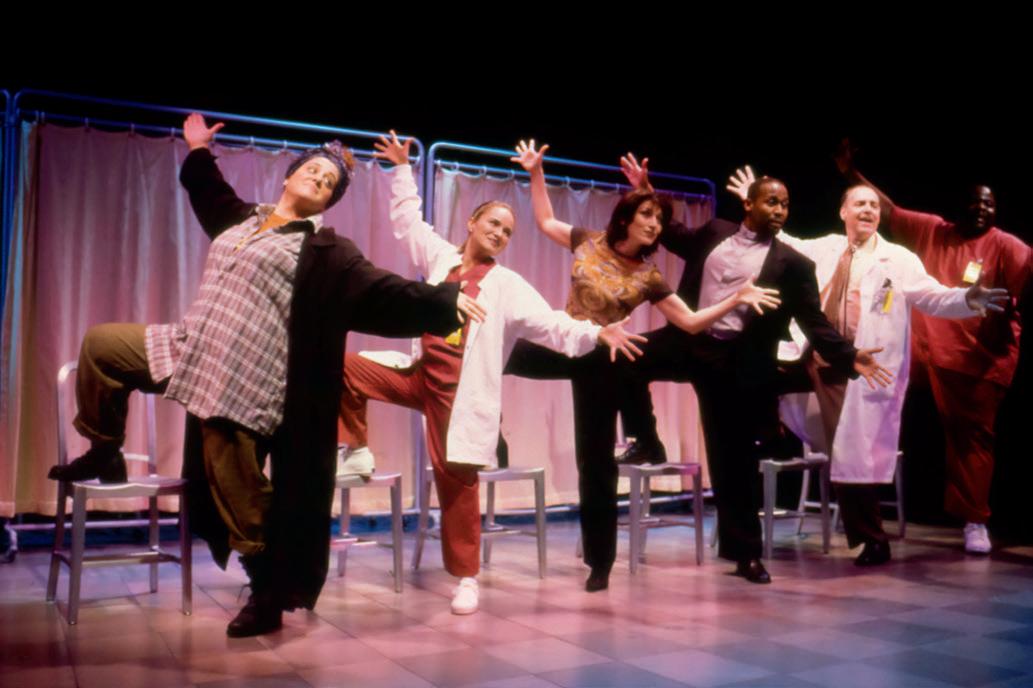
THEATERGOER
by Michelle Metcalf
MY MOTHER WAS AN ACTRESS. She had audition wigs, headshots, and a tacklebox filled with stage makeup. She was a single mother, so I often tagged along to her jazz classes, voice lessons, rehearsals for shows on and off Broadway. Whenever she had the chance, she went to the theater, and as far back as I can remember, I sat in the seat by her side.
I grew up watching curtains rise and fall, the swooshing on and off of scenery. I learned to unwrap my pack of cherry Chiclets only when the music swelled and never forget a sweater to combat the chilly A/C.
My mother rarely gasped or sobbed at home, but sometimes she would at a matinee. Clutching her Playbill, she’d well up at the first notes of an overture, and now, without fail, so do I.
When I became a mother, I knew I’d take my daughter, Ella, to the theater the moment she came of age. As it turned out, that age was two, when Lincoln Center Theater mounted a lavish revival of The King and I in 2015.
I didn’t want her to miss the ship that sailed onto the stage or the gaggle of King’s children singing “My cup of tea,” with their pinkies out.
It wasn’t the craziest of ideas to consider taking her so young. Ella was still, with an old soul’s focus. Plus, her nursery songs were more Kander & Ebb than Barney, more “Bobby, Baby” than
“Baby Shark.” Maybe she’d sit through one act or even two if I played it right.
I arranged for seats at the back of the orchestra, an easy escape should she take to kicking the seat in front of her or talking in an outside voice.
As it turned out, she was the perfect patron. I didn’t have to shush her once. She was riveted and I was thrilled.
Planning to leave at the second intermission, I scooped her up and headed for the exit. She pointed back to the house wanting to see the rest of the musical.
I’d like to tell you Ella was hooked on theater from that day forward, that she woke up every morning clamoring for a yogurt squeezy and a Broadway show. She did not. But I kept taking her.
When my daughter turned ten, Sarah Ruhl’s Becky Nurse of Salem came to the Mitzi Newhouse. Ella wanted to see it. Her first play.
There’d be no dancing or singing, I told her, only grownups talking about grownup things. Undeterred, we went with my mother one Sunday, and Ella sat between us.
After the performance, I asked her if it was everything she’d hoped for, to which she just shrugged. But soon after, she asked for the poster, something she’d never done before. While Taylor Swift and Olivia Rodrigo placards hang on the bedroom walls of many of her classmates, Ella has one of an Off-Broadway play.
Of course, I’m bragging, but I also feel like my work here is done. I have a good feeling she will go to the theater when she grows up and, should she have children, take them along.
Ella is now eleven. Last week we saw Uncle Vanya. Too soon for a play about dashed potential and the futility of life? Maybe. Two acts in, I was anxious enough to lean in and tell her Chekhov plays are always sad. I’d wanted to shield her from the thought that adulthood held nothing but existential despair.
But really, what would be her take-away, if anything at all?
Then, as the play neared its conclusion, Ella spoke to me in the darkness. “The violin boy loves Sonya,” she said.
There’s so much unrequited love in Vanya, but here was a yearning I’d missed. I looked to the violinist and only then saw what Ella had seen.
“You’re right!” I whispered and squeezed her hand, because someone, at last, loved Sonya, and because, while sucking a grape flavored Tootsie Pop, my daughter had communed with the story with no help from me.
